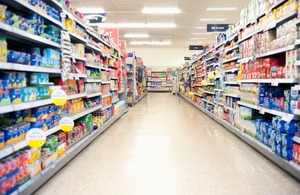Consultation launched to make food labelling fairer and clearer
Environment Secretary launches proposals to make food labelling clearer and fairer, delivering on commitment to back British farming

Plans to give shoppers more information about how and where their food is produced and ensure British farmers’ products get the recognition they deserve, were launched today (Tuesday 12 March) by Environment Secretary Steve Barclay.
The proposals for fairer food labelling will ensure greater transparency around the origin of food and methods of production, helping consumers make decisions that align with their values.
The consultation looks at how to improve country of origin labelling for certain goods, including how and where this information is displayed and what products should be included. For example, if imported pork is cured into bacon in the UK and features a Union Jack, exploring ways to make it more obvious to consumers that the pig was reared abroad – such as increasing the size of the country of origin text, or placing it on the front of the packet.
It also sets out proposals to require ‘method of production’ labelling on pork, chicken and eggs. These include a mandatory five-tier label for both domestic and imported products which would differentiate between those that fall below, meet and exceed baseline UK animal welfare regulations, which are some of the highest in the world.
The consultation was announced by the Environment Secretary at the Oxford Farming Conference in January, and builds on commitments in the Government food strategy - GOV.UK (www.gov.uk).
It follows recently announced measures designed to support farmers and promote fairness in the supply chain, including the largest ever round of farming grants announced by the Prime Minister at the NFU conference in February, an annual Farm to Fork Summit to increase industry collaboration, and new regulations to ensure fair and transparent contracts for dairy farmers.
Environment Secretary Steve Barclay said:
This government backs British farmers, who work hard to produce food to world-leading standards and maintain our nation’s food security. British consumers want to buy their produce, but too often products made to lower standards abroad aren’t clearly labelled to tell them apart.
That is why I want to make labelling showing where and how food is produced fairer and easier to understand – empowering consumers to make informed choices and rewarding our British farmers for producing high-quality, high-welfare food.
James Bailey, Executive Director of Waitrose, said:
We have a proud history supporting British farmers and are the leading retailer for animal welfare. Everyone deserves to know where their food comes from - how it was grown, reared or made.
Better information boosts demand for higher standards, as we’ve seen with mandatory egg labelling. Extending this to more products benefits shoppers, farmers, and animals.
We support the government’s efforts to improve transparency and ensure shoppers aren’t misled, while giving farmers recognition for their commitment to animal welfare.
Fidelity Weston, Chair of the Consortium of Labelling for the Environment, Animal Welfare and Regenerative Farming (CLEAR) said:
We are looking forward to the opportunity to comment on Defra’s proposed food labelling consultation and we are glad to see that progress to help the consumer understand more about how and where their food has been produced is beginning to be considered.
We in the UK have some of the highest farming standards, producing quality food products. That needs to be recognised in the marketplace. To achieve this, we need a clear definition of the many terms used to describe the method of production, and transparency and honest data about how the food was produced on the farm, and right through to the end product.
Through this, we have an opportunity to support the transition put in place by the Government to move the UK to more agroecological farming methods with improved outcomes for nature, the environment and people, alongside food production.
Creating fairer labels that back British farmers is vital for the UK economy. British farmers already produce about 60% of the food we eat, with the UK agri-food and seafood sectors creating more than £120 billion of value for the economy every year, and employing more than 4 million people.
The consultation also seeks views on whether it should be mandatory requirement to state the origin of meat, seafood and dairy products outside of the home, for example on menus in cafes and restaurants, to give consumers access to the same information while dining out as when cooking at home.
The consultation will run for eight weeks, closing at 23:45 on 7 May 2024.
Notes to Editors
We are seeking views on options for changing origin labelling including:
- Mandatory origin labelling for minimally processed meat products, such as bacon
- Increased visibility of origin labelling
- Mandatory origin labelling for certain foods in the out of home sector, for example restaurants
- Greater control of the use of national flags on labels
The consultation also proposes:
- A mandatory label with five tiers and underpinning standards that are primarily based on method of production, differentiating between products that fall below, meet and exceed relevant baseline UK animal welfare regulations.
- The label would cover pork, chicken and eggs applying to both domestic and imported products. Labelling for dairy, beef and sheep meat will be kept under review, subject to further consultation.
- This would apply to all unprocessed pork, chicken and eggs and certain prepacked and loose minimally processed products with pork, chicken or egg.
We are also seeking views more generally on how seafood is labelled.